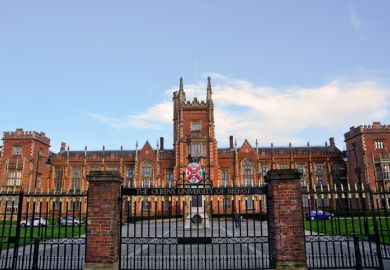Source: Report Digital
On course? Government recruitment targets were missed despite the bursaries
The bursary system designed to encourage graduates to take up teaching must be more “equitable” if it is to succeed, a university’s head of initial teacher education has said.
Kate Green, director of initial teacher education at the University of Southampton, said she had so far seen no indication that the Department for Education’s bursary scheme - which offers high-achieving students up to £20,000 to train as teachers in certain subjects - is drawing more graduates to the profession.
“The bursaries don’t seem to be attracting people who wouldn’t have gone into teaching. We certainly haven’t had any sudden influx of applications from people who wouldn’t have otherwise applied,” she said. “As I understand it, [that is] the aim of the bursary - to encourage more people into teaching.”
She said that Southampton programme directors felt the system was starting to drive away students with 2:2 degrees, particularly in maths and science, because the lower bursary they receive is not sufficient for them to be able to afford to enter teaching.
Her comments follow the publication in November of the DfE’s Initial Teacher Training Census 2012, which showed that the government missed recruitment targets for physics and mathematics in 2012-13 - a year after introducing bursaries in these subjects, modern foreign languages and chemistry.
Graduates with a first-class degree can apply for the top-rate bursary of £20,000 in these subjects. Students with 2:1s and 2:2s may apply for aid worth £15,000 and £12,000 respectively.
By November, there were 900 new entrants in physics and physics with mathematics teacher-training courses, against a DfE target of 925. There were 2,500 new mathematics trainees of a targeted 2,635.
A DfE spokesman said the figures were still very respectable. “This year’s number of physics teaching trainees is the highest since records were first kept, and recruitment has risen by 60 per cent since 2010,” he said.
“In addition, reaching 95 per cent of the target of maths trainees this year has been encouraging, especially as we have achieved a significant improvement in quality - 62 per cent of trainees in the subject have a 2:1 or higher.”
However, Ms Green said first-class degree students, especially physicists, were unlikely to be swayed by £20,000 to train. She cited their “longer-term views…[because of] other employment opportunities available to them”.
“Probably the bursary system needs to be made a bit more equitable, spread a bit more evenly between subject areas,” she said.
Register to continue
Why register?
- Registration is free and only takes a moment
- Once registered, you can read 3 articles a month
- Sign up for our newsletter
Subscribe
Or subscribe for unlimited access to:
- Unlimited access to news, views, insights & reviews
- Digital editions
- Digital access to THE’s university and college rankings analysis
Already registered or a current subscriber?




